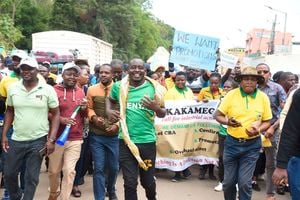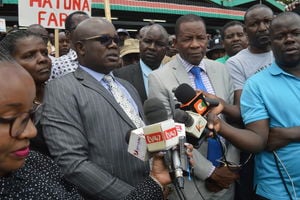
Universities Academic Staff Union Secretary-General Constatine Wasonga and his Kenya Universities Staff Union counterpart Charles Mukwaya on September 11,2024 when they issued a seven-day strike notice.
Learning in public universities is set to be disrupted this week when lecturers begin a strike over a pay dispute, adding to the chaos in the education sector already rocked by grievances from learners and their instructors.
Two unions have instructed their 30,000 members in public universities and constituent colleges to boycott duty from Wednesday over implementation of a salary raise stipulated in a collective bargaining agreement (CBA) that is due to lapse next year.
The strike will plunge universities in further turmoil coming on the back of protests by students who have demanded that the government withdraws a new funding model that has seen households slapped with hefty fees and students burdened with loans.
This will further aggravate the crisis in the education sector after a recent crippling strike by secondary school teachers who are still discontented with a deal their union leaders signed.
Junior school teachers are on a go-slow, worsening the crisis in the new education level struggling with congestion due to inadequate facilities including classrooms and laboratories.
Two years since President William Ruto’s ascension to power, the education sector continues to witness significant turbulence, raising concerns about the long-term effects. Despite early optimism about reforms, persistent challenges have cast doubt on the effectiveness of the administration’s policies.
One of the most visible signs of trouble is the chronic underfunding of schools and universities. Public institutions have faced delays in the disbursement of capitation funds, making it difficult for them to operate effectively.
The Competency-Based Curriculum (CBC), which was initially touted as a game-changer, has struggled to take off due to financial constraints.
Universities have borne the brunt of the financial crisis, operating with crippling debts and therefore failing to pay their staff on time. This has led to threats of strikes, even as staff demand better salaries. The government’s slow response to these concerns has compounded the problem, with unions decrying the lack of commitment to fully implementing the 2021-2025 CBA.
University Academic Staff Union (Uasu) and Kenya Universities Staff Union (Kusu) last week issued a seven-day strike notice, citing delays in the payment of full salaries as per the CBA. They lamented that other public service employees have enjoyed salary and allowance adjustments since 2021 while university workers have been left behind.
Last year, the Ruto administration rolled out the new higher education funding model, replacing the differentiated unit cost model. The new model provides targeted scholarships and loans based on students’ socio-economic backgrounds.
The model has encountered significant implementation issues. Many universities have struggled with financing under this new system, which, rather than addressing the needs of underprivileged students, has led to a funding shortfall. Consequently, universities are facing budget cuts, resulting in diminished academic resources and faculty strikes.
“From the word go we gave our stand, we do not know where this funding model came from and who came up with this. You cannot determine the future of a student based on the background of the parents, it is very clear that as a union we rejected it because we have not been told the mode of disbursement. If my parents are poor, it should not be announced to everybody,” said Uasu Secretary-General Constantine Wasonga.
The lack of sufficient government funding, coupled with an increase in student population, has pushed many universities to the brink of collapse. Students have expressed frustration over delayed scholarships and the poor quality of education.
Ramesh Saxena, an official of University of Nairobi Students Association (UNSA), expressed frustration with the current funding system and called for a complete overhaul of the bands in which students are categorised depending on financial needs, claiming that many learners are being inaccurately placed.
In primary and secondary schools, the introduction of CBC has intensified pressure on teachers, many of whom feel inadequately trained and overwhelmed. Despite President Ruto’s response to concerns by forming a task force to review the CBC, the reforms have offered only partial relief.
Critics argue that the reforms have not tackled fundamental problems such as inadequate teacher recruitment and training.
Kenya Union of Post Primary Teachers Deputy Secretary-General Moses Nthurima described the state of education in the country as “sorrowful.”
He criticised the government’s decision to confine Grade 8 learners to primary schools.
“These students are being denied the chance to benefit from the more comprehensive resources available in secondary schools, where each subject is supported by specialised facilities. By confining them to primary schools, the government risks creating a lost generation,” said Mr Nthurima.
Mr Nthurima noted that the CBC, originally intended to promote equal opportunity, now appears to be increasingly influenced by commercial interests. He said that the system is driving privatisation as many parents opt for private schools as public education becomes less reliable.
He also expressed concern that this shift is impacting teacher employment. He warned that the quality of education is at risk as public schools struggle with shrinking resources and inadequate funding.
“Public education, once a pillar of our society, is on the verge of collapse,” he stated.
Despite ongoing efforts to upgrade school infrastructure, stark disparities persist. Many primary schools, especially in underserved and rural areas, are still grappling with severe deficiencies that undermine the learning environment and student experience.
Kenya National Union of Teachers Secretary General Collins Oyuu said the presidential task force on reforms had led to significant improvements and streamlining of CBC. He praised the decision to have junior school within primary schools, arguing that it aligns well with the age and needs of the learners.
“One urgent priority is the construction of Grade Nine classrooms,” he said.
He added: “What we need now is proper participation from all stakeholders. Issues like the funding model need to be addressed thoroughly, and I’m confident that, if discussed in detail, they can resolve any remaining challenges.”









